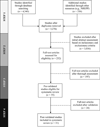Culturally Grounded Prevention for Minority Youth Populations: A Systematic Review of the Literature
- PMID: 26733384
- PMCID: PMC4738149
- DOI: 10.1007/s10935-015-0414-3
Culturally Grounded Prevention for Minority Youth Populations: A Systematic Review of the Literature
Abstract
Contemporary prevention science has focused on the application of cultural adaptations of evidence-based prevention programs for minority youth populations. Far less is known about culturally grounded methods that are intended to organically develop prevention programs within specific populations and communities. This article systematically reviews recent literature on culturally grounded interventions used to prevent health disparities in ethnic minority youth populations. In this review, we assessed 31 peer-reviewed articles published in 2003 or later that fit inclusionary criteria pertaining to the development and evaluation of culturally grounded prevention programs. The evaluated studies indicated different approaches toward cultural grounding, as well as specific populations, geographic regions, and health issues that have been targeted. Specifically, the findings indicated that most of the studies focused on the development and evaluation of culturally grounded HIV/STI and substance abuse prevention programs for Mexican-American, African American, and American Indian/Alaska Native youth residing in the South or Southwestern US. These studies largely relied on community-based participatory or qualitative research methods to develop programs from the "ground up." This review has implications for the development of future culturally grounded and culturally adapted prevention programs targeting underserved minority youth populations and geographic regions. Specifically, it identifies populations and regions where culturally grounded prevention efforts are underdeveloped or non-existent, providing some scientific direction for the future development of these types of programs.
Keywords: Culturally grounded prevention; Health disparities; Health promotion; Minority youth.
Conflict of interest statement
The authors have no conflicts of interest to report in the publication of this manuscript.
Figures



Similar articles
-
Targeted mass media interventions promoting healthy behaviours to reduce risk of non-communicable diseases in adult, ethnic minorities.Cochrane Database Syst Rev. 2017 Feb 17;2(2):CD011683. doi: 10.1002/14651858.CD011683.pub2. Cochrane Database Syst Rev. 2017. PMID: 28211056 Free PMC article.
-
Health professionals' experience of teamwork education in acute hospital settings: a systematic review of qualitative literature.JBI Database System Rev Implement Rep. 2016 Apr;14(4):96-137. doi: 10.11124/JBISRIR-2016-1843. JBI Database System Rev Implement Rep. 2016. PMID: 27532314
-
The Effectiveness of HIV Prevention Interventions in Socioeconomically Disadvantaged Ethnic Minority Women: A Systematic Review and Meta-Analysis.Am J Public Health. 2017 Dec;107(12):e13-e21. doi: 10.2105/AJPH.2017.304067. Epub 2017 Oct 19. Am J Public Health. 2017. PMID: 29048965 Free PMC article.
-
Behavioral interventions to reduce risk for sexual transmission of HIV among men who have sex with men.Cochrane Database Syst Rev. 2008 Jul 16;(3):CD001230. doi: 10.1002/14651858.CD001230.pub2. Cochrane Database Syst Rev. 2008. PMID: 18646068
-
Interventions for preventing eating disorders in children and adolescents.Cochrane Database Syst Rev. 2002;2002(2):CD002891. doi: 10.1002/14651858.CD002891. Cochrane Database Syst Rev. 2002. PMID: 12076457 Free PMC article.
Cited by
-
Improvement of Electronic Health Record Integrated Transition Planning Tools in Primary Care.Pediatr Qual Saf. 2020 May 18;5(3):e282. doi: 10.1097/pq9.0000000000000282. eCollection 2020 May-Jun. Pediatr Qual Saf. 2020. PMID: 32656460 Free PMC article.
-
Scoping Review of Outdoor and Land-Based Prevention Programs for Indigenous Youth in the United States and Canada.Int J Environ Res Public Health. 2025 Jan 28;22(2):183. doi: 10.3390/ijerph22020183. Int J Environ Res Public Health. 2025. PMID: 40003409 Free PMC article.
-
Deep-Structure Adaptations and Culturally Grounded Prevention Interventions for Native Hawaiians: a Systematic Review of the Literature.J Racial Ethn Health Disparities. 2021 Jun;8(3):570-578. doi: 10.1007/s40615-020-00815-6. Epub 2020 Jul 14. J Racial Ethn Health Disparities. 2021. PMID: 32666508 Free PMC article.
-
The Role of Relational Harmony in the Use of Drug-Refusal Strategies of Rural Native Hawaiian Youths.J Ethn Cult Divers Soc Work. 2016;25(3):208-226. doi: 10.1080/15313204.2016.1146190. Epub 2016 May 10. J Ethn Cult Divers Soc Work. 2016. PMID: 28133439 Free PMC article.
-
The Relationship Between Ethnocultural Identity Measures and Youth Substance Use Among a School-Based Sample: A Focus on Native Hawaiian Youth.Asian Am J Psychol. 2019 Sep;10(3):206-217. doi: 10.1037/aap0000157. Asian Am J Psychol. 2019. PMID: 32983371 Free PMC article.
References
-
- Bernal G, Jiménez-Chafey MI, Domenech Rodríguez MM. Cultural adaptation of treatments: A resource for considering culture in evidence-based practice. Professional Psychology: Research and Practice. 2009;40(4):361–368.
Publication types
MeSH terms
Grants and funding
LinkOut - more resources
Full Text Sources
Other Literature Sources

